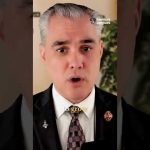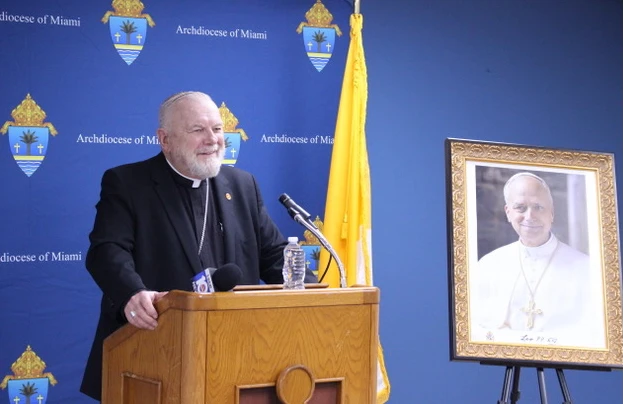
“The Christian is supposed to answer the question ‘Who is my neighbor?’, and the answer is: ‘The one who needs me,’” said Miami Archbishop Thomas Wenski during an Oct. 9, 2025, press conference in Miami. / Credit: Emily Chaffins/CNA
Miami, Florida, Oct 10, 2025 / 07:00 am (CNA).
“There’s somebody here who wants to talk to you,” the receptionist said to John Berry.
Now the president of the Society of St. Vincent de Paul USA (SVdp USA), Berry was serving the Georgia branch when a woman arrived at the office with a check. The stranger wanted to support the organization’s goals of helping people overcome poverty. Her donation was large, but her reason for donating was even more astounding.
“A number of years ago, I was down on my luck, and you all helped me,” she said. “I’m in a position now where I can help you.”
Berry recalled the encounter while pondering Pope Leo XIV’s first apostolic exhortation, Dilexi Te, published Oct. 9, centering on compassion for the poor. The exhortation’s introductory phrase — from which the title is derived — is “I have loved you,” from Revelation 3:9.
Indeed, the first American pope’s message is about the necessary exchange of love between the poor and those who serve, as mirrored by Berry and the donor.
Archbishop Thomas Wenski of Miami recognized the major papal milestone by holding a press conference Thursday to unpack Pope Leo’s words. He summarized the pope’s message: “We are to love the poor, not to blame them for their poverty but to assist them so they can discover and own their … dignity as human beings.”
During the press conference at the Archdiocese of Miami pastoral center, the archbishop spoke about one of the key ideas in Dilexi Te, “accompaniment,” which informs the SVdP donor’s story.
“Accompaniment would be treating them as a brother or sister and not lording it over [them],” Wenski said. Otherwise, “they themselves feel offended in their dignity, and then what we’re doing is not so much trying to help them but [instead] trying to make us feel good.”
On the contrary, accompaniment can be far from the feel good.
“Accompaniment means that we roll up our sleeves and work with them, and oftentimes when doing so we’re not going to feel good because it’s going to require a lot of sweat and tears,” the archbishop added.
Indeed, SVdP USA strives to embody the Catholic mindset of accompaniment, as volunteers dialogue with impoverished families and individuals to tailor the method of aid to their specific situations. Some of SVdP USA’s offerings include monetary aid, food pantries, free pharmacy programs, shelters, clinics, and education centers.

“We’re not the kind of agency where somebody who’s in need walks in the door, fills out a form, slips it under a hole in a glass wall, and then next thing you know, somebody says, ‘OK, we’ll pay your bill’ or hands over a box of food,” Berry explained. “Ours is a sit-down conversation, a personal encounter, where we talk with people and create a solution together. We find out from them what are their needs, what are the things that are challenging them.”
In the Archdiocese of Miami, Catholic Legal Services represents immigrants in need, and people struggling with the English language can attend parish-based ESL (English as a second language) classes.
As Wenski put it: “The Christian is supposed to answer the question ‘Who is my neighbor?’, and the answer is: ‘The one who needs me.’”
“It is significant because these first apostolic exhortations tend to be the putting forth of a strategic plan for the priorities of the pope for his pontificate,” he added.
Both the archbishop and Berry pointed out that Pope Leo’s missionary outreach in Peru likely informs his perspective on the poor within the exhortation as someone who walked the walk.
“This is his heart,” Berry said.















